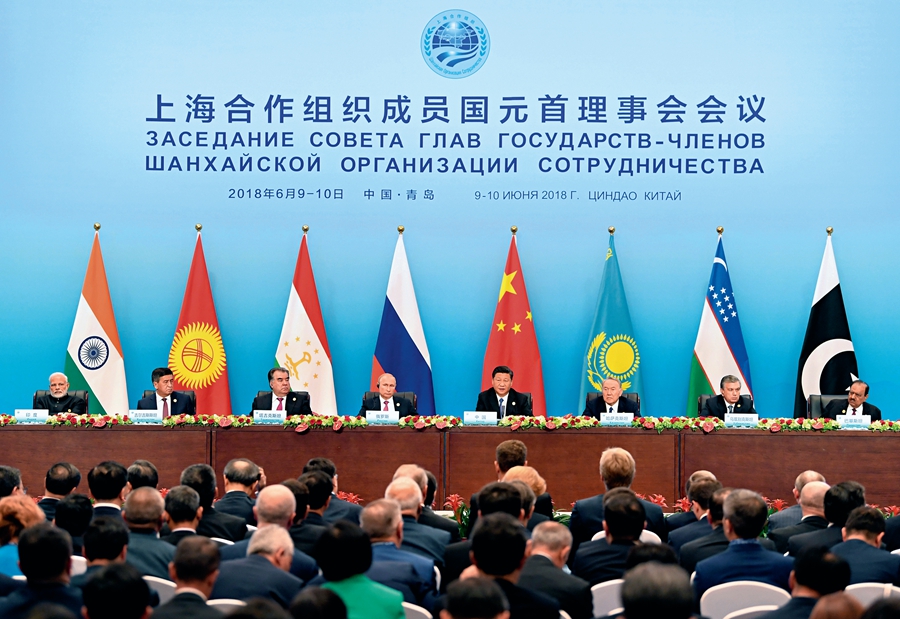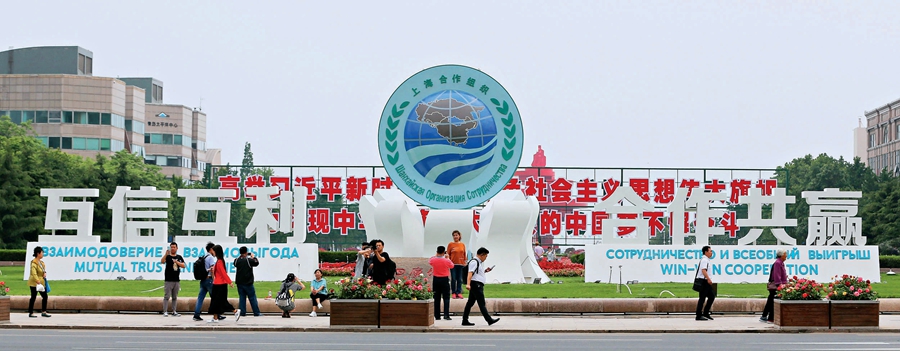CHINA commented on the relationship between the Shanghai Cooperation Organization (SCO) and the theories and practices of international relations for the first time on June 10, when President Xi Jinping addressed the 18th Meeting of the Council of Heads of Member States of the SCO in Qingdao, east China’s Shandong Province.
Reviewing the SCO’s development trajectory, Xi stressed that the evolution of the organization was “a major breakthrough in the theories and practices of international relations, created a new model for regional cooperation, and contributed to peace and development in the region.”
Regional Integration
Most comprehensive regional organizations started from limited trade and economic integration and then developed cooperation in the political and security spheres. This is also the process of regional integration advocated by neo-functionalism, one of the theories of Western international relations.
The founding of the SCO is based on the political mutual trust accumulated by the Shanghai Five mechanism, the precursor of the SCO, which had been introducing confidence-building measures in border areas and collaborating in security areas like military forces reduction. Combating terrorism, separatism, and extremism was the organization’s prior mission from the outset. Therefore, the creation of the SCO originates from cooperation in political areas, which is totally different from the traditional integration process where economic integration spills over into the political area.

On June 10, state leaders of the SCO member countries meet with the press; President Xi Jinping, chairing the meeting, gives a speech.
Created in the post-Cold War world, the SCO was the result of a common desire of member states to strengthen regional cooperation rather than deal with the tumultuous changes of the international political environment. It is an organization with an endogenous driving force, distinguishing itself from those which were passively founded as the member states wanted to ally with each other to form a stronger group and resist pressure from outside the group.
Shanghai Spirit
The Shanghai Spirit reflects the SCO’s guiding principles, which feature mutual trust, mutual benefit, equality, consultation, respect for diverse civilizations, and pursuit of shared development. Mutual trust and mutual benefit are the preconditions for smooth operation of the organization and win-win cooperation. Equality and consultation are the guiding principles for member states to establish multilateral partnerships through sincerely consulting with each other on an equal footing. Respect for diverse civilizations refers to the attitude toward different civilizations, cultures, political systems, and development paths of member states. The pursuit of shared development is the objective of the SCO.
Some of the core values of the Shanghai Spirit may also be adopted by other regional organizations, but only the Shanghai Spirit encompasses all of them. The significance of the Shanghai Spirit lies in that it effectively responds to concerns of member states. The principle of mutual trust and mutual benefit eases concerns over uneven distribution of benefits under the framework of the SCO. The principle of equality and consultation ensures that small countries will not be bullied by big ones. Respecting diverse civilizations helps member states break the prophecy of the Clash of Civilizations through dialogue. The Shanghai Spirit may appear to be an abstract concept, however, staying committed to it is the basis for the SCO to surmount various obstacles and move forward smoothly.
Embracing Inclusiveness
In 2017, Pakistan and India were admitted as full members of the SCO, expanding its member states from six to eight. The differences in national conditions of the member states have always existed since its inception in terms of not only historical tradition, religion or ideology, but also national strength, development path, institutions, or ethnic groups. Despite this, the SCO has functioned as an open and inclusive regional organization, pursuing the principle of non-alliance, non-confrontation and not targeting any third party, and actively establishing connections with non-member states and national organizations. Its door is always open to new members.

Qingdao is sprucing up in every possible way as the city gets ready to welcome visitors from afar to the 18th SCO Summit.
It is common for international organizations to admit new members. In general, regional organizations set specific requirements regarding political systems or geographical location in such admissions. In comparison, the SCO is inclusive and clearly pledged to promoting exchanges and mutual learning among different civilizations and cultures. This is what distinguishes the SCO from other regional organizations, and also another breakthrough in accepting new members as a regional organization.
It has been proved that the SCO is neither just a talking shop nor paralyzed by conflicts of interests between China and Russia, effectively dispelling the ungrounded accusations by Western media. Its 17 years of development and achievements prove it is an organization of strong vitality. It shows that the SCO, despite internal diversity, could solve problems caused by differences and achieve tangible and concrete outcomes. This is mainly attributed to the guiding principles and unique operational mechanisms of the SCO, which facilitate the achievement of tangible results and accumulation of political trust in the process of cooperation. In this way, member states successfully seek common ground while preserving their differences, boost mutual confidence, and achieve shared development. In the process, the member states have shown increasing confidence in the future of the SCO.
Saying No to Hegemony
The principle of mutual respect among member states is a breakthrough of the SCO manifesting the Shanghai Spirit. China and Russia were two major powers within the framework before 2017. The number increased to three when India joined the organization that year. Before the expansion, China and Russia maintained a stable relationship with other member states, and no clash between big and small countries within the framework ever occurred.
Unlike some regional organizations where hegemony and power politics prevail as big powers often bully weak ones, member states of the SCO deal with each other on an equal footing. Hegemony and power politics are usually played out in two scenarios. First, one power dominates a certain regional organization and gives orders in the capacity of a hegemonic country. Second, two or more dominating powers conspire to coerce weak states into following orders. To date, there have been no such acts of hegemony or power politics among the SCO states.
In short, the SCO transcends outdated concepts such as the Clash of Civilizations, the Cold War, and zero-sum mentality, and has showcased a brand-new model of regional cooperation over the past 17 years. Certainly, the SCO is still growing, as President Xi said, “The road ahead, bumpy as it may be, will lead to a promising future.” What he said is to acknowledge uncertainties in future development. He is also calling for corresponding adjustment to adapt to such changes. Until now, the SCO has indeed made a major breakthrough in the theories and practices of international relations and deserves to be lauded.
ZENG XIANGHONG is a professor with the Institute for Central Asian Studies of Lanzhou University.